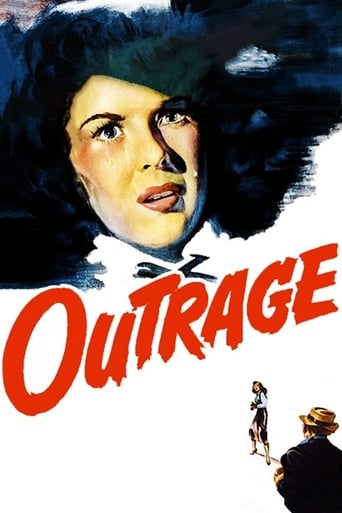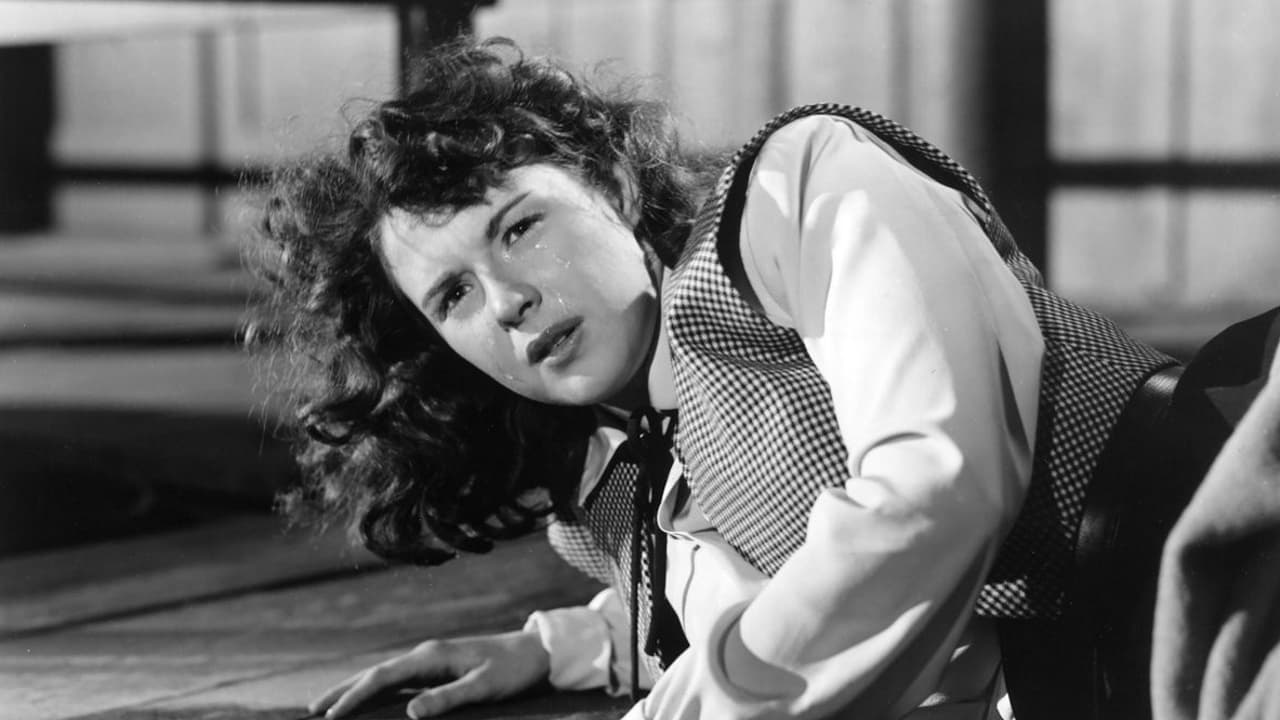cwade22
I was going to give it 1 star, but I respect Ida lupino. One thing I really can't stand is Bad writing! The Female lead is running and all active, then she trips on a very small staircase, and just decides to go to SLEEP on the very hard platform! REALLY?! All she had to do was KEEP RUNNING! Writing that forces characters to do stupid things like run away from a man whistling, but she didn't just keep running, she had to keep stopping and hide. Dumb! Also, she was all energetic in her fleeing, but she tripped on Purpose, over a big garbage can! Then, she got in a truck and Honked the horn, ON PURPOSE! The acting was so bad and forced, but I couldn't discern if it was the bad writing leading the bad acting, or just these actors were so bad. I've been watching old tv shows lately. The concepts are nice, but the writing is Dumb! As if it were lazily written. Characters that are smart, doing dumb things because the writer had to finish the episode. Every time I see dumb writing and characters doing dumb things that contradict their normal behavior, I just repeatedly say aloud, "this show sucks. The writing sucks!" This film is old, but that's no excuse to have poor acting and poor writing! All the positive reviews seem to ignore the obvious flaws that ruin the film. How can ANYBODY watching make it past the Chase scene without asking questions and being confused as to how dumb She was?! Also, the Very loud Truck Horn didn't stop! Nobody bothered to stop it! An old man living in the building next to the loud truck horn Stuck his head out, then shut his window to go to sleep! REALLY?! I doubt his window could be that sound proofed to block out that loud horn sound! And he just closes the window?! WITHOUT GOING DOWN TO CHECK WHY THE HORN WAS GOING?! Really?! That detail is UNREALISTIC! I guess, if thatvold man went down to check the horn, he'd have PREVENTED the rape, and the movie wouldn't have happened. Still, spare us a dumb movie with unrealistic details. I'd rather there be no movie than force a movie, write unrealistic details and depict the characters as dumb. In what world is it smart for a girl to run away from a whistling man, INTO A DARK ALLEY?! She could've stayed on the street! Also, How did she pass out, all of a sudden, seconds after She was running?! To take this movie seriously is to dumb my brain down. I can't let pass certain details because details are like puzzle pieces! You can't just throw in a few pieces that don't fit, just to complete the puzzle piece count. If The girl were smarter, and She never ran into a dark alley, and that old man went down to check the truck, the movie would be more believable. Don't write details that make characters look dumb and careless! This female lead looked dumb and careless. This movie was about rape! Yet, I didn't pity the woman because she made the dumbest mistakes and the writing was so bad. How could the writing be this bad?! How can you write the girl to be so stupid, to run in a dark alley, or an old man to ignore the LOUDEST TRUCK HORN RIGHT OUTSIDE HIS WINDOW?! Somebody resurrect Ida Lupino, and get her to answer these questions, then get her to correct these very obvious flaws. I wanted to like the movie, but it didn't earn my respect. Future Writers, PLEASE LEARN FROM THIS FILM! Very good Concept, Very Bad writing. You can have the best concept ever, but Bad writing will Ruin it. Even with the best actors, it'd still be ruined. How can people just ignore these big details/flaws at the start?! If you watched Her running and kept asking "Why did she just do that, or go there, or fall down and go to sleep on that Very Hard Wooden Stage?!" You are not alone! And if you asked any of these questions, that makes it difficult to take this film seriously. I don't like my mind being insulted. Again, CONCEPT IS great! Writing and acting are VERY BAD!
JohnHowardReid
Producer: Collier Young. Copyright 25 September 1950 by RKO-Radio Pictures, Inc. A Filmmakers Presentation. New York opening at the Criterion: 14 October 1950. U.K. release: floating from December 1951. Australian release: 23 February 1951. 6,988 feet. 77 minutes. SYNOPSIS: A traumatized assault victim flees her home town.NOTES: Third film for director Ida Lupino and final film for veteran electrician S.H. Barton (Son of Kong, The Little Minister, etc.). Although elaborately "introduced" in the movie, both Mala Powers and Tod Andrews made their movie debuts in the early 1940s. Rita Lupino is the director's younger sister.COMMENT: Despite its deceptive poster, trailer and pre-credits sequence, this well-polished "B" is not a film noir. True, both plot and staging have noirish elements, but the bulk of the movie is a one-sided romance between an affable young minister (Tod Andrews aka Michael Ames) and the psychologically disturbed heroine (convincingly played by Mala Powers). Ida Lupino, as director and co-writer has ensured that the movie looks and sounds true-to-life by utilizing some evocative locations as well as conventional studio sets. The support roster, headed by dull-as-ditchwater Robert Clarke, merely serves as background to the main Andrews-Powers romantic action, though Paris and Mellen are each allowed an effective moment.
schell-7
The didacticism and sheer sweetness (a function of film score as well as script and direction) of the cinematic action following the deft direction of a traumatic rape scene will strike many of today's viewers as dated. But upon closer inspection "Outrage" is subtle where least expected--both in terms of its understandings of rape and its expression of a feminine point of view in cinema.Lupino will not allow a male finance's hasty and almost violent insistence on marriage immediately following the rape of the protagonist (played by Mala Powers) to become separated in the victim's--and by extension the viewer's--mind from the central theme, and plot-motivating device, of rape itself. The villainy of rape cannot be solved by the seemingly heroic gesture of the male, whose "sacrifice" places as much emphasis on the woman's exceptional circumstances as do the violation committed by the rapist. Such attempts to deny the reality of rape simply serve to ensure its persistence. The attempt to erase part of victim's past is another way of treating her as less than human.The scene in which Powers' character hits an overly aggressive playboy with a wrench lacks the semblance of realism because Lupino shoots it from the point of view of the victim whose action in the present is dictated by the emotions triggered by her remembrance of the past. It's doubtful that any male director would have captured the scene in such non-violent, non-realistic detail and yet enabled us to see the action for what it is--an attempt by the character to erase the impression that the initial criminal act has left on her emotion-mental being.Some modern viewers will no doubt accuse Lupino of being overly idealistic in portraying the rapist less as a criminal than himself the victim of an illness--one that would be curable, moreover, in a more socially aware and progressive culture. Unfortunately, the sheer logistics of psychological treatment leading to cures of those guilty of such heinous criminal acts will make Lupino's sentiments seem hopelessly naive to today's viewers. But is that sufficient reason to fault the director for acknowledging the gender divide as a two-way street?Aside: Notice the scene in which the empowering new male friend is shown playing the piano from a camera POV just opposite his hands. In a subsequent scene, the piano is shown placed against the wall, which would make such a shot impossible.As first I couldn't help but marvel at the similarity of a heavy detective to Hal March, host of the the highly popular "60,000 Question," prior to its exposure. Looking at the credits will reveal that it IS Hal March (the loss of 15-20 pounds obviously didn't hurt his career as much as the downfall of the popular quiz show).
ivegonemod
I really enjoyed the movie until the rape. When the rapist was chasing Ann, I couldn't understand why she kept stopping to look around. She stopped about ten times, I just couldn't understand it. When she came across the taxi cab, she didn't scream bloody murder, maybe they would have stopped? Maybe not.I also did not like how they kept having her fall and pass out or whatever during the chase, and once more when she was "on the run." So many things annoyed me. I hated how the people in her neighborhood and at work kept looking at her like she had done something wrong because she had been raped, it could have been any one of those women or one of the men's female loved ones.After she runs away, and is at a diner, a radio broadcast comes on saying that she has been missing. She covers her face. Why? There was no description given out. She only drew attention to herself.During the movie she behaved like a nut. She sees a police officer and starts acting so strange it only makes you pay more attention. She acted like she was a child who could be forced to go back to her hometown instead of a grown woman who could live wherever she pleased.



 AD
AD



